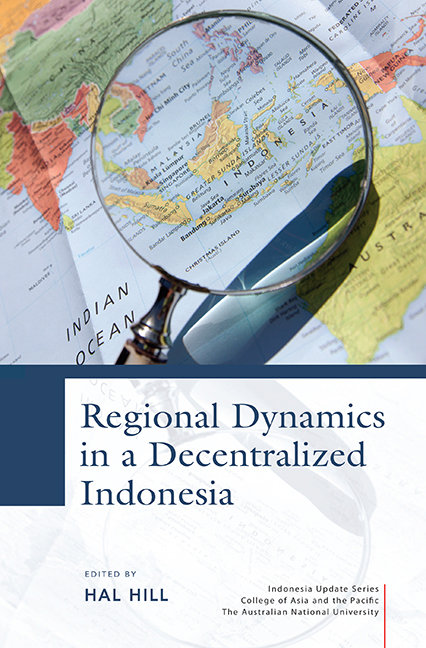Book contents
- Frontmatter
- Dedication
- Contents
- Tables
- Figures
- Contributors
- Acknowledgments
- Glossary
- Map of Indonesia
- 1 An introduction to the issues
- PART 1 HISTORICAL, ECONOMIC, POLITICAL AND SOCIAL PATTERNS
- PART 2 DECENTRALIZATION AND GOVERNANCE
- 6 Twelve years of fiscal decentralization: a balance sheet
- 7 Local governance and development outcomes
- 8 Decentralization, governance and public service delivery
- 9 What determines the quality of subnational economic governance? Comparing Indonesia and Vietnam
- PART 3 LOCAL-LEVEL PERSPECTIVES
- PART 4 MIGRATION, CITIES AND CONNECTIVITY
- PART 5 CHALLENGES FOR INDONESIA'S PERIPHERY
- Author index
- Subject index
- INDONESIA UPDATE SERIES
7 - Local governance and development outcomes
from PART 2 - DECENTRALIZATION AND GOVERNANCE
Published online by Cambridge University Press: 21 October 2015
- Frontmatter
- Dedication
- Contents
- Tables
- Figures
- Contributors
- Acknowledgments
- Glossary
- Map of Indonesia
- 1 An introduction to the issues
- PART 1 HISTORICAL, ECONOMIC, POLITICAL AND SOCIAL PATTERNS
- PART 2 DECENTRALIZATION AND GOVERNANCE
- 6 Twelve years of fiscal decentralization: a balance sheet
- 7 Local governance and development outcomes
- 8 Decentralization, governance and public service delivery
- 9 What determines the quality of subnational economic governance? Comparing Indonesia and Vietnam
- PART 3 LOCAL-LEVEL PERSPECTIVES
- PART 4 MIGRATION, CITIES AND CONNECTIVITY
- PART 5 CHALLENGES FOR INDONESIA'S PERIPHERY
- Author index
- Subject index
- INDONESIA UPDATE SERIES
Summary
INTRODUCTION
Improved local governance has been the spirit of decentralization in Indonesia. Enacted not long after the start of the reformasi era in 1998, and effective since 2001, Law 22/1999 on Regional Government explicitly stated that democratic principles and public participation would be the basis of regional autonomy. The law also referred to various decrees issued by the People's Consultative Assembly (Majelis Permusyawaratan Rakyat, MPR) in 1998 to reform governance and counter corruption. The revised law on regional government (Law 32/2004) continues to emphasise the importance of community empowerment, grassroots participation and democratic principles to accelerate people's welfare and improve regional competitiveness.
Globally, good governance is believed to be the main path to sustainable economic growth and improvements in welfare. In Indonesia, a number of studies have examined the relationship between the quality of governance and economic growth. This chapter complements those studies by analysing the correlation between various local governance indicators – economic, budget allocation and public sector financial management – and development outcomes, with the latter defined with reference to household-level expenditures and the Human Development Index (HDI).
Section 7.2 discusses recent developments in local governance, including key reforms to lift standards, and describes the current state of public sector financial management. Section 7.3 focuses on issues related to local budget policy and execution, and section 7.4 provides a brief overview of levels of development across the country. Section 7.5 dwells on the correlation between economic and social outcomes, good governance indicators, budget policy indicators and administrative characteristics. The chapter concludes by offering some policy implications.
RECENT DEVELOPMENTS IN LOCAL GOVERNANCE
More than a decade after decentralization, it is not clear that the quality of local economic governance has improved. This is the main conclusion from two datasets derived from surveys of businesses conducted by Regional Autonomy Watch (Komite Pemantauan Pelaksanaan Otonomi Daerah, KPPOD) and the Asia Foundation in four provinces: East Java, West Nusa Tenggara and East Nusa Tenggara (as part of nationwide surveys conducted in 2007 and 2010–11) and Aceh (which was surveyed separately in 2008 and 2010) (KPPOD and Asia Foundation 2008a, 2008b, 2010, 2011). These were the only four provinces to be surveyed twice, allowing comparison of the progress of local economic governance over time.
- Type
- Chapter
- Information
- Regional Dynamics in a Decentralized Indonesia , pp. 156 - 185Publisher: ISEAS–Yusof Ishak InstitutePrint publication year: 2014

